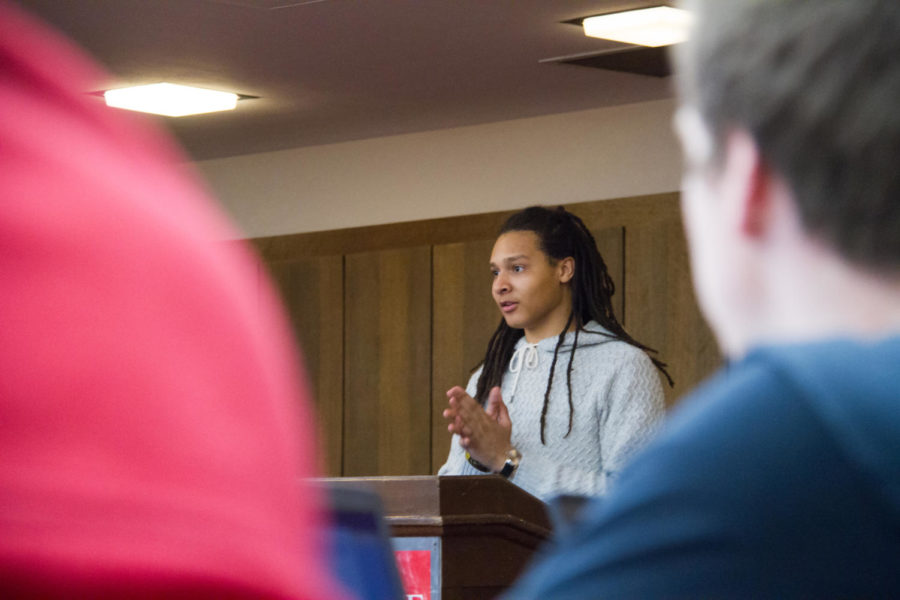Q&A: StuGov Diversity and Inclusion director discusses committee, goals
Diversity committee chair Julian Neely addresses Student Government during a meeting March 1.
October 1, 2017
For Julian Neely, StuGov director of diversity and inclusion, representation is essential.
The committee he heads is going into its third year, and with that, Neely feels it has found its footing enough to really start putting into action its ideas and goals.
In a question-and-answer session with the Daily, Neely touched on his objectives for the year:
Q: Do you mind telling me about your position?
A: Director of Diversity and Inclusion is the title of my position. It really focuses on diversity as well as inclusivity on our campus and making sure that all students are represented and have a platform to voice their opinions and perspectives. I’m making sure that our university is keeping in mind underrepresented students.
So, when we look at representation in training, as well as events, ways to educate our student body to understand social justice and trying to attract those that don’t really come out to those conversations. That’s kind of my ideal, because diversity and inclusion — just that title — those two words are very broad.
I work very closely with Dr. Reginald Stewart [Senior Vice President of Diversity and Inclusion.]
Q: What are some of the things you would like to see during your time in this position? What are some of your current initiatives?
A: I want my committee to continue to grow, that’s one objective. Another one is to make sure that we have every identity possible in that committee that can speak on the behalf of underrepresented groups, as well as groups that are already present.
We [also] have subcommittees. Right now we have a committee focused on ADA [Americans with Disabilities Act] approvals and making sure that Iowa State is staying true to those requirements and certifications.
We have a subcommittee focused on promotional campaigns, [which are] campaigns we can do on campus year long that allow students to think critically about what’s going on and what it is visually presenting. We’re in the works of trying to identify what that looks like. We have one [idea] focused on the discrimination policy as well as better ways to communicate diversity and inclusion and our sense of community.
Q: How do you see your position in making sure that students feel comfortable not only at the university but also coming to you at Student Government?
A: A lot of it goes back to outreach. By having our presence on campus and showing them the purpose of Student Government and the work that Student Government does on a daily basis. But also just being friendly faces, not being people that stay in their office.
It’s by making sure that we are staying true to the mission of talking about we are the voice of students. The only way you can get the voice of students is communicating with students face-to-face.
Q: Does your committee work with other committees within Student Government to make sure that they’re being inclusive or that all perspectives are on the table?
A: We are building the bond between the committees. Right now, one of the plans is to hopefully… having a training for those in the other committees so they can have that understanding and awareness.
Q: Do you mind telling me about Donuts for DACA?
A: We’re working on a workshop… that gets students to write letters to Congress and Senate to get their support for DACA and those in that program. We’re going to work with Krispy Kreme donuts because students love donuts and Krispy Kreme because we don’t have it in Ames. It allows students [to think] ‘Oh I can get this for just writing this letter.’ We’re working on how it’s all going to work.
Q: Do you see yourself organizing events like that for different issues on campus, as well?
A: Yes, hopefully. We have to be in the community. We can’t stand still when these certain situations happen.
Q: How has this committee changed since you first got started to how you see it now as director?
A: Since it was new three years ago, it’s still a baby. It was pretty much trying to identify what the position was, what are the responsibilities, what can this committee do?
Now, we have that and so it’s more structured and more able to get things done… It’s more like, we have some ideas now let’s put it to work and make it happen. The vice president of diversity and inclusion’s office has been a lot of help in trying to structure and get it organized.
Q: What do you want students to know about you, your committee and Student Government when it comes your role on campus and making sure it’s inclusive and all voices are heard?
A: Something they can know about me is that I’ve had a passion for this since I was in high school… When students come here, they should know what they are getting themselves into and [the message] they see in promotions and advertisements — we’re staying true to that.
When they come here, they should know that they are welcome to express any aspect of their culture and that they have a support system through the university.
And that they can see their representation — that they can see themselves in this university. When they walk around they can see that Iowa State appreciates and respects their culture, their identity, their religion and race. That the university respects them, period. I want to see that.

















